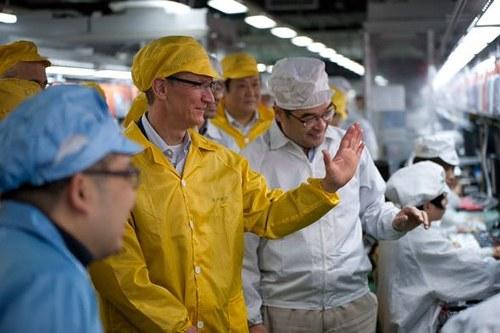Apple's annual capital expenditures report came in $2.3 billion higher than anticipated, which has led one analyst to believe Apple could have put a significant amount of money into key but struggling supplier Sharp.
In an analysis posted on Wednesday, Horace Dediu of Asymco noted that Apple spent one-third more than it expected in capital expenditures in fiscal 2012. And some of the acquisitions made by Apple were made through what he called "uncharacteristic or unorthodox means."
Apple had originally forecast in October of 2011 that it would spend about $8 billion on capital expenditures. But the final number came in at $10.3 billion, with nearly all of the over-spending related to "product tooling, manufacturing process equipment and infrastructure."
Dediu's theory is that Apple may have placed a significant investment in Sharp, which provides display panels for devices like the iPhone and iPad. Sharp has also found itself in financial distress, and earlier this year was in line to take a $1 billion investment from Foxconn — a payout intended to build a new LCD plant to boost production for Apple products before the deal fell through because of Sharp's poor finances.
Apple CEO Tim Cook visits a Foxconn iPhone plant in March.
"My guess is that these attempts to shore up Sharp are directed by Apple to ensure both continuity of supply and a balanced supplier base (offsetting Samsung, another supplier)," Dediu wrote. "If Sharp were to enter some form of bankruptcy, the key plant(s) used in producing screens for Apple might be 'up for grabs' by creditors and they might be taken off-line, jeopardizing apple's production capacity, irrespective of contractual obligations."
He hypothesizes that Apple financed the deal in exchange for preorders of new components. In this scenario, Apple may have paid for a Sharp screen production line by prepaying for components from the company — an investment that would show up on Apple's annual 10-K filing.
Apple's filing, made public a week ago, also revealed that it increased spending on research and development by almost $1 billion. The increase to $3.4 billion in its 2012 fiscal year represented growth of 39 percent from the year prior.
 Neil Hughes
Neil Hughes







-m.jpg)






 Marko Zivkovic
Marko Zivkovic
 Christine McKee
Christine McKee
 Andrew Orr
Andrew Orr
 Andrew O'Hara
Andrew O'Hara
 William Gallagher
William Gallagher

 Mike Wuerthele
Mike Wuerthele
 Bon Adamson
Bon Adamson




-m.jpg)



24 Comments
Horace Dediu is almost always right. He's probably someone you shouldn't even call an "analyst"considering all the idiots that inhabit said category that are regularly quoted here.
Horace Dediu is almost always right.
He's probably someone you shouldn't even call an "analyst"considering all the idiots that inhabit said category that are regularly quoted here.
He is better than the run of the mill analysts, but here he is totally speculating and I think he is off.
Have you seen a Sharp LCD in an Apple product teardown? Ever?
Sharp at best is a very small supplier of LCDs to Apple, if any at all.
I don't think Apple would risk 2Billion on a financially shaky, third/fourth source.
This makes sense.
But what would make even more sense is for Apple to invest $20-25B (assuming 30-60% premium) to acquire ARM Holdings. That would shake up the market. Heck, I bet Intel might even like it.
...he is totally speculating
Which makes it hard to dispute or support. During a period of world wide expanding availability and product upgrades, Apple spends an extra 25% over estimates on capital expenditures. The reason is... [fishes around in butt] Multi-billion dollar investment in Sharp!
Plausible, but pure speculation, followed by more speculation on the results of the speculation, which is now reported on an internet rumors site. I guess that makes it an absolute metaphysical certitude.
This makes sense.
But what would make even more sense is for Apple to invest $20-25B (assuming 30-60% premium) to acquire ARM Holdings. That would shake up the market. Heck, I bet Intel might even like it.
Why would Apple spend about 20% of its cash on ARM when it can very easily license the architecture and customize it? Are you thinking a defensive move to keep other mobile concerns from using it? That would seem like a worse deal than what Google got out of the Motorola acquisition. I'm not sure how you see this working out as a profitable and prudent use of cash? And how would Intel benefit from this ? I'm genuinely curious.